
For all of your household appliance repair needs ... We service all brands!
FIND A PARTChoosing between a gas and an electric range for your kitchen significantly impacts your cooking experience, utility bills, and overall kitchen functionality. Both options have unique advantages and disadvantages, which can influence your choice based on your specific needs and preferences.
Let’s explore whether you should get gas or electric range and their pros and cons.
Here are the pros of gas ranges.
And now, for the cons.
Let’s move on to the advantages of electric ranges.
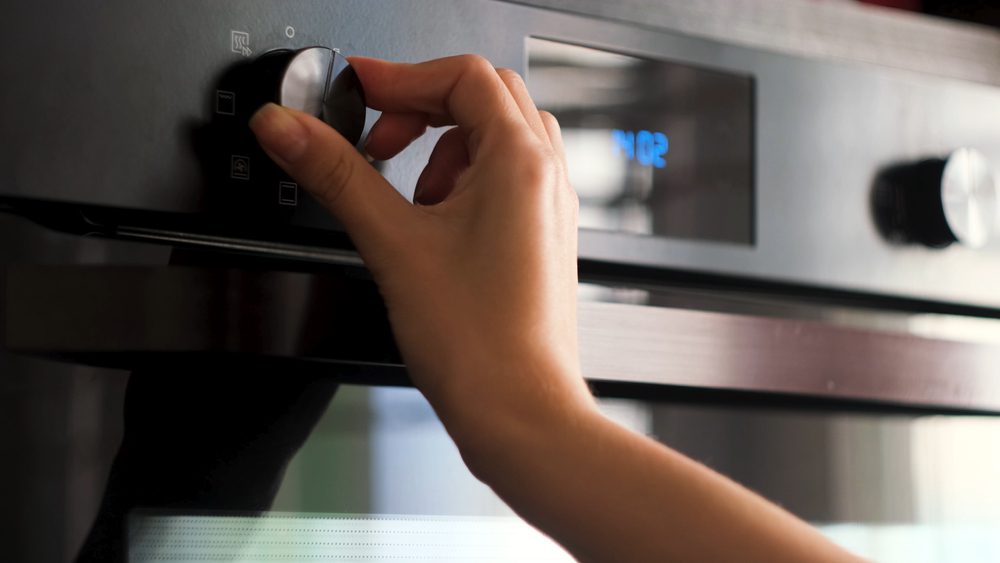
Ultimately, the best range for your kitchen depends on your individual needs. Weighing the pros and cons of each type will help you make an informed decision that enhances your cooking experience and fits your lifestyle.
Whether you opt for gas or electric, both types of ranges have the potential to transform your kitchen into a more functional and enjoyable space. A-Tech Repair has the knowledge and expertise to install and repair your range, whichever you choose.
If you have any questions about HVAC systems or queries about installations or repairs, contact A-Tech Appliance Repair, who will gladly assist.
An ice maker is a convenient appliance that many households rely on for a steady supply of ice. However, when your ice maker keeps freezing up, it can become a frustrating and recurring issue.
Understanding the common causes of this problem and how to address them can help you maintain a functional and efficient ice maker. Here’s a look at the typical culprits behind ice maker freeze-ups and practical solutions to keep your ice maker running smoothly, before calling a professional for an ice maker repair service.
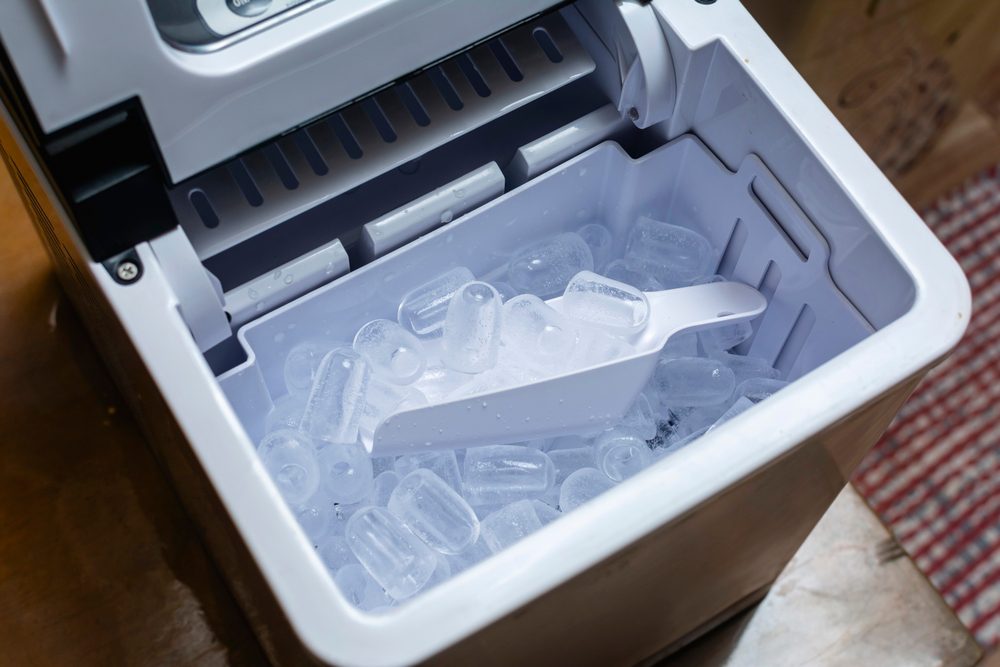
Here’s what might lead to your ice maker freezing up:
One of the most common reasons an ice maker freezes is improper temperature settings. If the freezer temperature is too low, the ice maker can overproduce ice, leading to blockages and freezing.
The ideal freezer temperature should be around 0°F (-18°C) to ensure optimal ice production without causing freeze-ups.
A malfunctioning thermostat can lead to incorrect temperature regulation within the ice maker. Suppose the thermostat is not accurately sensing the temperature. In that case, it may cause the ice maker to produce too much ice or not stop producing ice when the bin is full, resulting in freezing issues.
The water supply line is crucial for ice production. If it becomes clogged or frozen, it can restrict water flow, leading to incomplete ice cubes and freezing of the ice maker components.
Kinks or leaks in the water line can also cause similar problems.
A dirty or clogged water filter can impede water flow to the ice maker, causing it to freeze. According to the manufacturer’s recommendations, the water filter should be replaced regularly to prevent this issue.
Various components of the ice maker, such as the ice mold thermostat, water inlet valve, or the motor, can become defective over time. When these components fail, they can cause the ice maker to freeze up or stop working altogether.
So, how do you solve the problem? Here are some answers:
Ensure your freezer temperature is set to the manufacturer’s recommended level, usually around 0°F (-18°C). Avoid setting the temperature too low, as this can lead to overproduction of ice and subsequent freeze-ups.
Regularly inspect the thermostat, water inlet valve, and other ice maker components for any signs of wear or malfunction. Replacing faulty parts can prevent freeze-ups and keep your ice maker functioning efficiently.
Check the water supply line for any clogs, kinks, or leaks. If you find any issues, clean or replace the water line as needed to ensure a steady water flow to the ice maker.
Replace the water filter at the recommended intervals to maintain proper water flow and prevent clogs. A clean water filter ensures your ice maker receives a consistent water supply.
Perform regular maintenance on your ice maker, including cleaning the ice bin, checking for ice buildup, and inspecting all components for wear or damage.
Preventing your ice maker from freezing up involves proper maintenance, timely replacement of faulty parts, and ensuring the correct temperature settings. By understanding the common causes and solutions, you can keep your ice maker running efficiently and avoid the frustration of frequent freeze-ups.
However, not all ice maker problems can be fixed easily. A-Tech Repair can provide expert service and maintenance to ensure your appliance functions efficiently and is in top condition.
Contact us today!
Gas stoves are a kitchen essential, offering precise heat control for cooking. However, the burners can quickly accumulate grime, grease, and food debris, affecting their efficiency and appearance.
Regular maintenance is critical to ensuring your gas stove works safely and effectively. This complete guide on cleaning gas stove top burners will walk you through the process and provide tips to help keep your stove looking and functioning like new.
Cleaning gas stove top burners isn’t just about aesthetics. Burners clogged with debris or grease can cause uneven heating or make it difficult to ignite the flame. Then you would probably need a stove repair service.
If left uncleaned, food and grease buildup can also lead to unpleasant odors, potential fire hazards, and reduced stove efficiency. Maintaining clean burners not only prolongs the life of your stove but also enhances its performance.
Before you begin cleaning gas stove top burners, gather the following items to make the process easier:
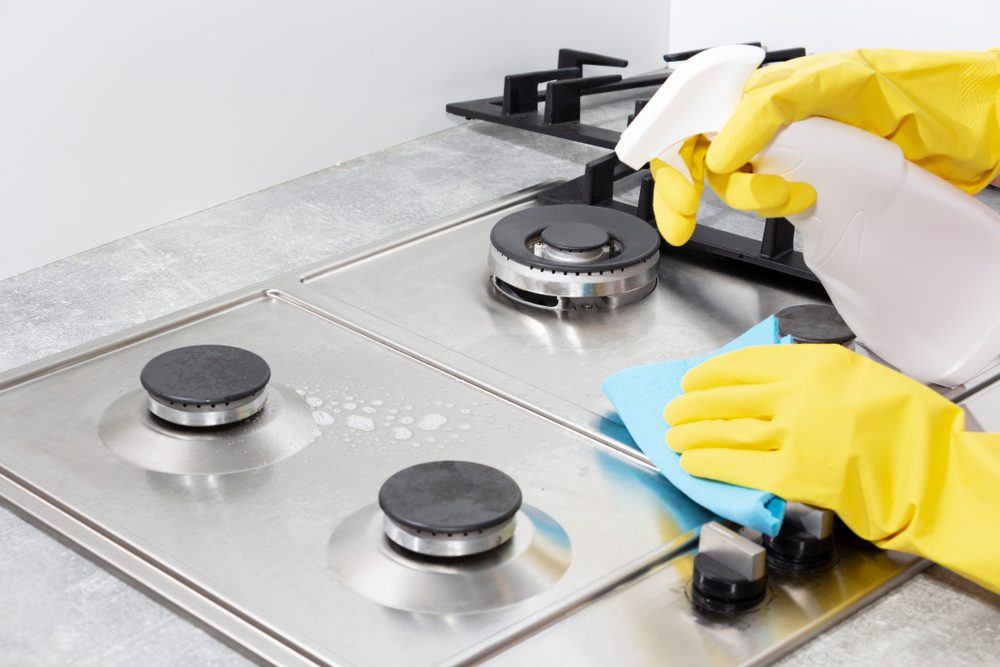
Follow this step-by-step guide to clean gas stove top burners efficiently.
Safety first! Before starting, ensure the stove is off, and the burners are completely cool. Also, turn off the gas supply to avoid accidental ignition while cleaning.
Start by carefully lifting off the burner grates. Set them aside for cleaning later. These grates can often accumulate grease so they may require soaking.
Remove the burner caps and heads from the stovetop. They can usually be lifted off easily.
This is the perfect opportunity to clean them thoroughly to loosen any stuck-on debris and grease. Soak the burner caps, heads, and grates in warm water and mild dish soap for 15 to 20 minutes.
After soaking, use a non-abrasive scrub pad or sponge to clean the burner caps and heads. Mix baking soda and water for stubborn stains and apply a paste to the dirty areas. Scrub gently to avoid damaging any parts.
Over time, burner holes can become clogged with food or grease, affecting gas flow—carefully clear these holes with a toothpick, needle, or brush.
Be cautious not to enlarge them, as this can affect performance.
Clean the stove top with warm, soapy water while the burners and grates are soaking. For extra grease-fighting power, spray a solution of equal vinegar and water.
Wipe down the surface with a microfiber cloth to remove any residue.
Once the burners and grates are clean, rinse them thoroughly with water to remove soap or baking soda. Dry them thoroughly with a cloth before reassembling them on the stove.
Place the burner caps, heads, and grates back in their positions. Ensure everything is correctly aligned before turning the furnace back on.
If cleaning gas stove top burners doesn’t resolve issues like uneven heating or frequent flare-ups, it may indicate a more significant problem with the stove’s components. A-Tech Repair is your trusted partner for all things related to gas stoves, from installation to repairs.
Contact us today!
Achieving perfectly baked goods can be challenging when your oven is not working as it should. One of the most frustrating issues bakers and cooks encounter is an oven cooking unevenly.
This can result in undercooked food on one side, overcooked on the other, or even burnt in spots.
Suppose you’re experiencing your electric oven cooking unevenly. In that case, it’s essential to identify the underlying cause to ensure your dishes come out perfectly cooked every time. Here are some common causes of uneven baking in electric ovens and how to solve them.
One of the primary reasons an oven cooks unevenly is inconsistent heat distribution. Electric ovens rely on heating elements at the cavity’s top and bottom. If these elements are not functioning correctly, they may not distribute heat evenly throughout the oven.
Solution: Inspect the heating elements when the oven is off and cool. Look for any visible signs of damage, such as blistering, cracks, or discoloration.
A faulty thermostat or temperature sensor is another common culprit behind uneven baking in electric ovens. The thermostat regulates the oven’s temperature, while the sensor measures the internal temperature and adjusts the heating elements as needed.
Solution: You can test the oven’s temperature by placing an oven thermometer in the center of the oven. Preheat the oven and compare the thermometer reading to the temperature set on your controls.
Sometimes, the issue isn’t with the oven but how you use it. Placing your baking racks can significantly affect how heat circulates your food, leading to uneven baking.
Solution: For most baking tasks, the middle rack is the best position, as it allows for optimal heat circulation. If you’re baking multiple trays of cookies or other items, try rotating them halfway through the cooking time to ensure even baking.
Many electric ovens have a convection fan designed to circulate hot air evenly throughout the cavity. If the fan is blocked, malfunctioning, or not operating at the correct speed, it can result in uneven baking.
Solution: Check if the fan is running when the oven is on. If it isn’t, or if it’s making unusual noises, it could be blocked by debris, food particles, or malfunctioning.
The gasket is the rubber seal around the oven door that helps maintain a consistent temperature by keeping heat from escaping. If the gasket is old, worn, or damaged, it can cause hot air to leak out, leading to uneven baking in electric ovens.
Solution: Inspect the gasket for wear or damage, such as cracks or gaps. Replacing a worn gasket is usually a quick and inexpensive fix that can significantly improve your oven’s performance.

Uneven baking in electric ovens can be frustrating, but troubleshooting can often solve it. Whether the issue lies with the heating elements, thermostat, rack placement, fan, or gasket, identifying the cause is the first step to ensuring your oven cooks evenly.
If you’ve tried these solutions and your oven is still cooking unevenly, it may be time to call the experts. A-Tech Repair specializes in troubleshooting and fixing oven issues, ensuring that your appliance operates at its best and your culinary creations turn out perfectly every time.
If you have any questions about HVAC systems or queries about installations or repairs, contact A-Tech Appliance Repair, who will gladly assist.
An ice machine is essential for many businesses and homes, especially during the hot summer months or in environments where ice is necessary. However, it can be frustrating when you encounter an issue with your ice machine not making ice.
Before you panic or rush to call a professional, there are several steps you can take to troubleshoot the problem. Often, the issue is something simple that can be fixed quickly, saving you time and money.
The first step in troubleshooting an ice machine that doesn’t make ice is to check the power supply. It’s easy to overlook. Ensure the machine is securely plugged in and the outlet functions correctly. You can test the outlet by plugging in another appliance to see if it works.
If the machine is connected to a switch, make sure that it is turned on. Also, inspect the power cord for any signs of damage that might interrupt the power flow.
An ice machine not making ice could also be due to a disrupted water supply. Check that the water line is connected correctly and that the valve is open.
Sometimes, the water supply line can become kinked or blocked, preventing water from reaching the machine. Ensure the line is straight and clear of obstructions.
The thermostat setting plays a crucial role in ice production. If the thermostat is set too low, the ice machine may not be cold enough to freeze the water into ice.
On the other hand, if it’s set too high, it could cause the machine to overfreeze, potentially leading to blockages. Check the manufacturer’s recommended settings and adjust the thermostat accordingly.

The ice mold could be the culprit if the ice machine is not making ice. Over time, mineral deposits or ice blockages can build up in the mold, preventing the machine from producing ice properly.
Carefully inspect the ice mold for any buildup and clean it if necessary. Use a soft cloth and warm water to remove any debris.
Sometimes, an ice machine does not make ice due to ice buildup within the unit itself. If you notice excessive frost or ice accumulation, it might be necessary to defrost the machine.
Unplug the machine and allow it to thaw completely. Once defrosted, clean the interior to remove any residual moisture before restarting the machine.
Sometimes, the problem might be mechanical. The motor, water inlet valve, or other components might malfunction, preventing the ice machine from working correctly.
Suppose you’ve checked the power, water supply, and thermostat, and everything seems fine. In that case, the issue might be with the internal mechanics. For further troubleshooting, consult the user manual or contact a professional repair service.
When an ice machine does not make ice, following these troubleshooting steps can often help identify and resolve the problem. Checking the power and water supply, adjusting the thermostat, cleaning the ice mold, defrosting the machine, and inspecting for mechanical issues are all essential steps to getting your ice machine back to entire operation.
However, if you’ve tried these troubleshooting tips and your ice machine still isn’t making ice, it may be time to seek professional help. A-Tech Repair specializes in fixing ice machines and can provide expert service to keep your machine running smoothly.
If you have any questions about HVAC systems or queries about installations or repairs, contact A-Tech Appliance Repair, who will gladly assist.
Have you ever walked into your kitchen only to be greeted by strange noises from your freezer? While the occasional hum or buzz is usual, persistent or unusual sounds can be concerning.
Understanding the reasons of why is your freezer making weird noises can help you troubleshoot and, if necessary, decide when to call in the professionals.
Here are some common causes of weird freezer noises and how to address them.
If your freezer is equipped with an ice maker, it’s often the prime suspect for strange noises. The sound of ice being made, falling into the bin, or the motor running can all create a range of noises.
However, a grinding or mechanical noise could indicate a problem with the ice maker’s motor or gears. To troubleshoot, inspect the ice maker for any visible blockages or damage.
If the problem persists, consider turning off the ice maker to see if the noise stops. If the problem persists, call professionals to get your freezer repaired.
Freezers periodically enter a defrost cycle to prevent ice build-up. You might hear popping, hissing, or sizzling sounds during this cycle.
These noises are typically standard and result from the melting ice dripping onto the defrost heater. However, if the sounds are excessively loud or prolonged, they might indicate an issue with the defrost timer or heater.
Checking the defrost components for signs of wear and tear can help identify if a replacement is necessary.
Most freezers have at least one fan to circulate cold air. These fans can sometimes become noisy due to dirt build-up, ice accumulation, or mechanical issues.
A high-pitched squeal or a rattling noise often points to a fan problem. Cleaning the fan blades and checking for ice build-up can resolve these noises.
Replacing the fan might be the best solution if the fan appears damaged or worn out.
The compressor is the heart of your freezer’s cooling system. When running, it’s normal for it to produce a low hum.
However, loud banging, clunking, or knocking noises can indicate a severe issue, such as a failing compressor or loose components. Given the complexity and cost of compressor repairs, it’s usually advisable to consult a professional if you suspect a compressor problem.
Sometimes, the noise source can be as simple as vibration or loose parts. For example, if your freezer is not level or in contact with cabinets or other appliances, it can create rattling or vibrating noises.
Checking that the freezer is on a stable surface and ensuring enough clearance on all sides can help minimize these sounds. Additionally, inspecting the interior and exterior for any loose screws or panels and tightening them can often silence annoying rattles.
As your freezer cools and warms slightly during regular operation, the materials inside can expand and contract, creating clicking or popping sounds. These noises are typically harmless and part of regular operation.
However, if these sounds are unusually loud or frequent, it might be worth investigating to rule out other issues.

While some noises from your freezer are standard, others can indicate underlying problems that need attention. Regular maintenance can prevent many issues.
However, if you’ve tried troubleshooting and the noises persist, it might be time to seek professional help. A-Tech Repair is the expert to call for any weird freezer noises, ensuring your freezer runs smoothly and quietly. Contact us whenever you need assistance with appliances like this!
A loud freezer fan can be more than just a minor annoyance; it could signal an underlying issue that needs attention. Whether it’s a persistent hum, a high-pitched squeal, or a rattling noise, understanding what these sounds mean and how to address them can help maintain your freezer’s efficiency and longevity.
Here’s a comprehensive guide on what a loud freezer fan might indicate and the steps you can take to silence it.
Freezers typically have at least one fan inside the unit, often called the evaporator fan. This fan is crucial in circulating cold air throughout the freezer compartment, ensuring the temperature remains consistent and food stays frozen.
If the fan becomes noisy, it’s often a sign that something is amiss.
Here are the four leading causes of a loud freezer fan.
Over time, dust, dirt, and food particles can accumulate on the fan blades, causing them to become unbalanced and noisy. Regularly cleaning the fan and surrounding area can prevent this build-up and keep the fan running quietly.
Ice build-up around the fan can impede movement, leading to loud grinding noises. A malfunctioning defrost system often causes this. Checking the defrost heater and timer and ensuring they function correctly can help prevent ice accumulation.
A high-pitched squeal or screeching noise usually indicates that the fan’s motor or bearings are worn out. These components can deteriorate over time due to normal wear and tear. If you suspect this is the issue, it may be necessary to replace the fan motor.
Sometimes, items inside the freezer can obstruct the fan blades, causing them to make noise. Ensure that food packages are not blocking the airflow and that there is enough space around the fan to operate freely.

Now, find the steps to get your freezer fan quiet below.
Before attempting any repairs or maintenance, always unplug the freezer to ensure safety.
Depending on your freezer model, the fan may be located at the back, top, or bottom of the freezer compartment. For the exact location, refer to your freezer’s manual.
Carefully inspect the fan for dirt, ice, or obstructions. Use a soft brush or cloth to clean the fan blades and surrounding area.
If ice is present, allow it to melt naturally or use a hairdryer on a low setting to defrost the area gently.
If cleaning does not resolve the noise, check the motor and bearings for signs of wear. If you’re handy with tools, you can replace these components yourself.
However, it’s best to call a professional to get your freezer fixed if you’re unsure.
After cleaning and inspecting the fan, reassemble any parts you removed and plug the freezer back in. Monitor the noise level to see if the problem has been resolved.
If you’ve tried the above steps and the fan is still noisy, it might be time to seek professional help. Persistent noise could indicate a more severe issue that requires expert attention.
For residents of Charlotte, NC, A-Tech Repair is the go-to choice for solving freezer issues. Their team of skilled technicians can quickly diagnose and repair any problems, ensuring your freezer operates smoothly and quietly.
Don’t let a loud freezer fan disrupt your peace; contact A-Tech Repair for prompt and reliable service.
Ensuring your heating system is in top working condition as winter approaches is crucial. A malfunctioning heater can lead to uncomfortable living conditions and even health risks during cold weather. Fortunately, homeowners with DIY know-how can diagnose and repair many standard heating system issues.
This article provides a step-by-step guide to troubleshooting and fixing fundamental problems with your home heating system.
Here are seven steps to diagnose a problem and repair your heating system.
Before attempting any repairs, it’s essential to know the type of heating system you have. The most common types include forced air, radiant heat, and hydronic (hot water baseboard). Each system has specific components and mechanisms, which will dictate the troubleshooting and repair processes.
Safety should be your top priority. Before you begin any work on your heating system:
For Forced Air Systems:
For Radiant Heat Systems:
Inspect Boiler Pressure: Low water pressure can affect system performance. Check the pressure gauge and refill the system if necessary.
For Hydronic Systems:
Sometimes, simply resetting the heating system can solve the problem. Please turn off the power to the system at the breaker, wait a few minutes, and then turn it back on. This can often reset the system’s internal circuitry and clear any minor errors.
Many modern heating systems have built-in diagnostics that display error codes on the thermostat or the unit itself. To interpret these codes, which can provide specific clues for troubleshooting, refer to your owner’s manual.
Depending on your technical skills and the complexity of the issue, you may be able to perform minor repairs:
If the above steps do not resolve the issue or if you encounter complex problems, such as issues with the heat exchanger, burner, or major electrical components, it’s best to call a professional. Heating systems can be complex; some repairs require specific tools and expertise.
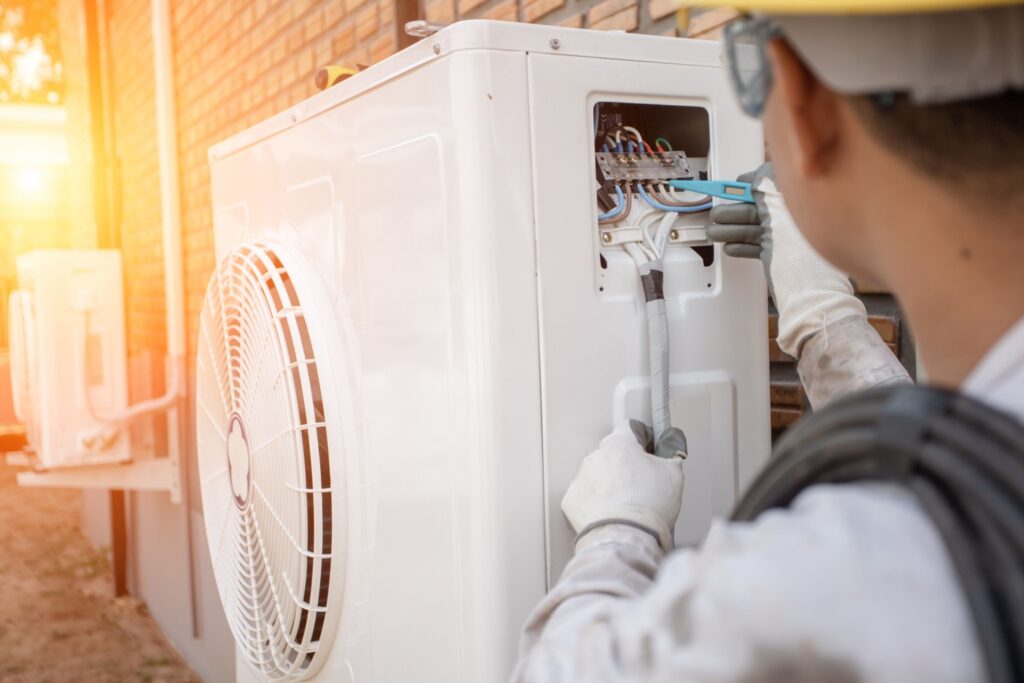
Regular maintenance and timely repairs ensure your heating system operates efficiently and safely. By following these steps, you can address many common issues and know when to call in the experts, such as A-Tech Repair.
If you have any questions about HVAC systems or queries about installations or repairs, contact A-Tech Appliance Repair, who will gladly assist.
Stoves and ovens are essential appliances in the modern kitchen, each playing pivotal roles in daily cooking routines. However, regarding sustainability and ease of use, some distinct differences and considerations influence your choice of one over the other.
Understanding these differences is crucial whether you’re fitting out a new kitchen or thinking about energy efficiency and practicality in meal preparation. This article will explore the sustainability and ease of use of stoves and ovens, helping you to make an informed decision for your culinary needs.
Here are the core differences between stoves vs ovens regarding energy efficiency and sustainability.
Gas or electric stoves offer direct heat and are commonly used for boiling, frying, and sautéing. Gas stoves are preferred for their control and instant heat, but from a sustainability perspective, they pose some challenges.
They burn natural gas, a fossil fuel, releasing carbon dioxide and other pollutants into the environment. On the other hand, electric stoves, especially those with induction technology, are more sustainable.
Induction stoves are highly efficient, as they reduce heat loss by directly heating the cookware via an electromagnetic field, making them a greener choice.
Ovens are typically used for baking, roasting, and broiling and are generally more energy-intensive due to the need to heat an ample enclosed space. Conventional electric ovens are less energy-efficient than stoves because they require preheating and longer cooking times.
However, advances such as convection technology have improved their energy efficiency. Convection ovens use fans to circulate hot air, cooking food more evenly and quickly, thus reducing energy consumption.
Moreover, newer models often feature improved insulation and energy-saving settings that minimize heat loss and power usage.
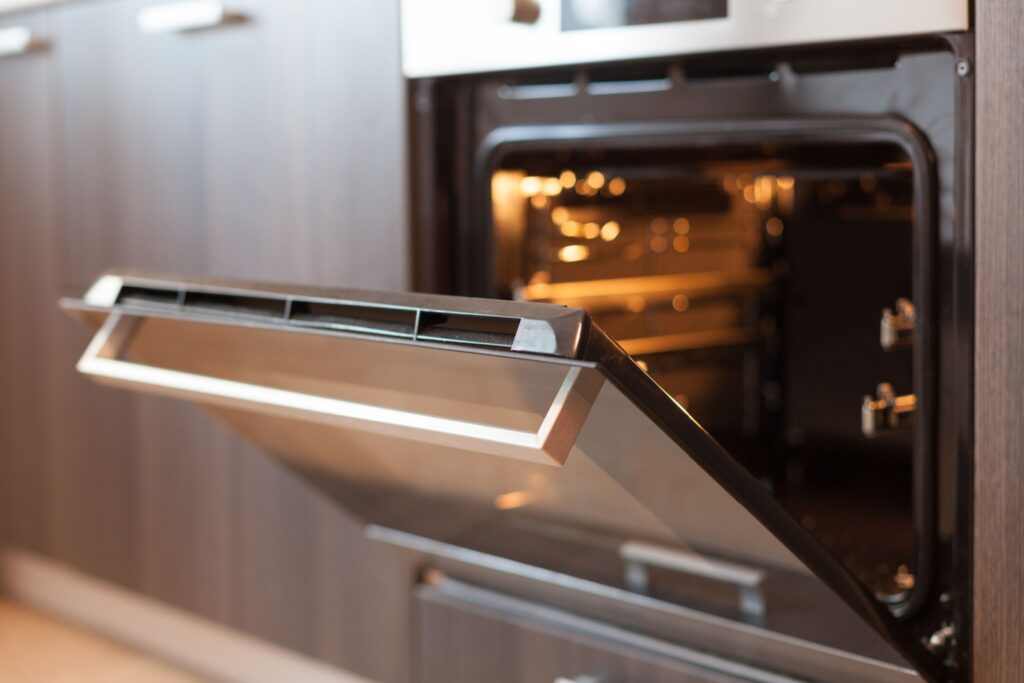
Let’s review the differences in ease of use between stoves and ovens.
Stoves are often seen as more user-friendly because of their versatility and speed. They heat up and cool down quickly, particularly gas stoves, allowing for precise heat control, crucial for tasks like searing meat or simmering sauces.
The stovetop’s layout also makes it easy to manage multiple pots and pans simultaneously, which is ideal for dishes that require attentive cooking and immediate heat adjustments.
While ovens may not offer the same level of immediacy in heat adjustment as stoves, they excel in hands-off cooking. Once the temperature is set and the timer is on, the oven works for you, which is particularly advantageous for busy cooks.
This allows for multitasking in the kitchen without constantly monitoring the cooking process. However, the initial setup and wait times for preheating can be considered a minor inconvenience compared to the instant heating capabilities of stoves.
Choosing between a stove and an oven or finding the right balance depends mainly on your cooking style, kitchen space, and energy efficiency goals. An induction stove paired with a convection oven could offer energy efficiency and convenience for those looking to reduce their carbon footprint.
Additionally, consider how the ease of use aligns with your cooking habits; if you prefer quick, attentive cooking, a stove might be preferable, but for those who appreciate the ability to “set and forget,” an oven can be incredibly beneficial.
Both stoves and ovens have merits and drawbacks concerning sustainability and ease of use. By understanding these aspects, you can better align your kitchen appliances with your environmental values and cooking preferences, ensuring a more efficient and enjoyable culinary experience. You can learn more about what suits you with A-Tech Repair and get expert installation or repairs with a stove or oven.
If you have any questions about HVAC systems or queries about installations or repairs, contact A-Tech Appliance Repair, who will gladly assist.
Maintaining a clean ice maker is essential for ensuring the quality and safety of the ice produced. If not cleaned regularly, ice makers can accumulate minerals from water, leading to blockages and mold and bacteria growth.
Fortunately, cleaning an ice maker in your freezer is often straightforward. However, it’s also important to recognize when professional help might be necessary. Here’s a comprehensive guide on how to clean ice maker in freezer and when to seek assistance.
Here’s how to clean your ice maker in five easy steps.
Before you begin cleaning, make sure to turn off the ice maker. Most units will have a power switch, which can be turned off by lifting the metal arm or pressing a button.
Additionally, consider turning off the water supply to the ice maker to prevent any accidental water flow during the cleaning process.
Empty any ice from the bin and remove the trunk itself. Use warm, soapy water to clean the container thoroughly. Rinse it well to ensure no soap residue is left behind, as this could transfer to your ice.
Allow the chest to air dry completely before reinserting it into the freezer.
Wipe down the ice maker’s interior surfaces using a soft cloth or sponge and mild detergent with warm water. Be sure to clean any accessible parts, including the ice mold and the mechanism that ejects the ice.
Avoid harsh chemicals or abrasive cleaners that could damage the ice maker or contaminate your ice.
If you notice mineral deposits (often white and chalky), prepare a solution of equal parts white vinegar and water. Use this solution to clean the affected areas gently. The vinegar’s acidity helps dissolve the minerals.
After washing with the vinegar solution, rinse the area thoroughly with clean water.
After cleaning, dry all surfaces with a clean towel or let them air dry completely. Once dry, reassemble any parts you removed, replace the ice bin, and turn the ice maker and water supply back on.
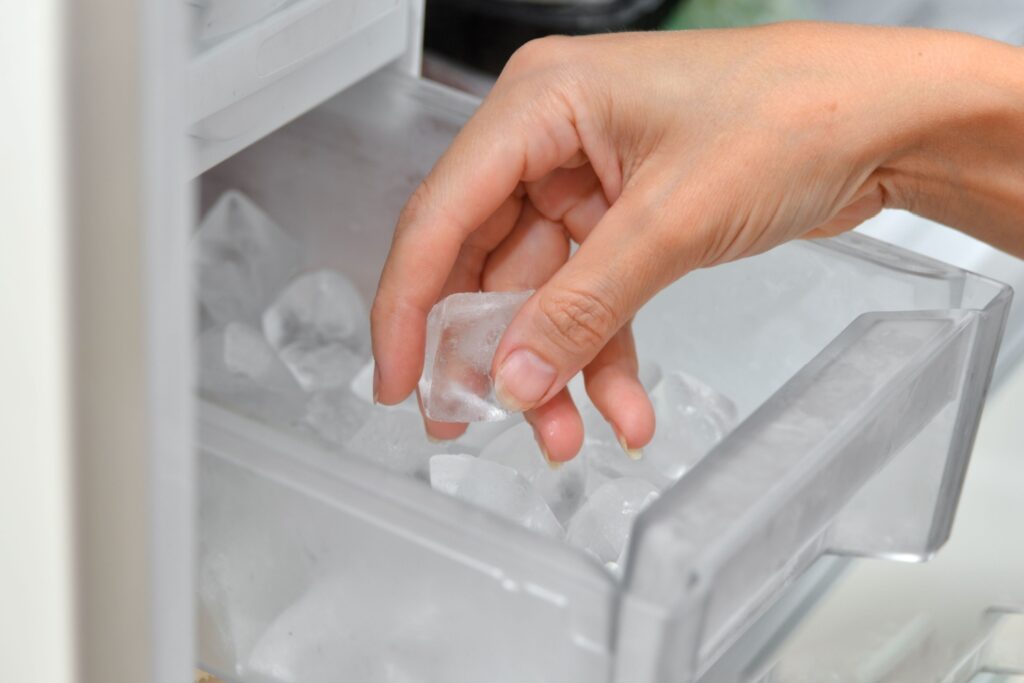
While routine cleaning can be done at home, there are situations when it’s best to seek professional help:
Regularly cleaning your ice maker ensures it operates efficiently and produces clean, safe ice. Most maintenance and minor cleaning tasks can be performed at home with basic supplies.
However, recognizing when to call a professional can save you time and prevent further damage to your appliance. A-Tech Repair has expert engineers who can help you overcome the more complex challenges of cleaning and fixing your ice machine.
If you have any questions about HVAC systems or queries about installations or repairs, contact A-Tech Appliance Repair, who will gladly assist.
Interested in finding out more about the services we offer? Fill out the form below!






